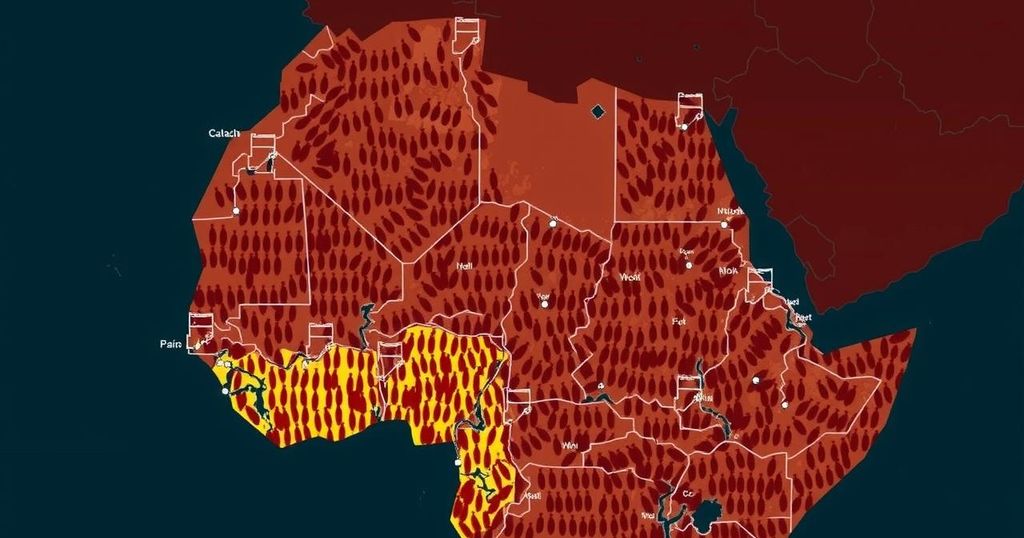Sudan Civil War: Death Toll Significantly Exceeds Previous Estimates

Recent analysis from the London School of Hygiene and Tropical Medicine suggests that the death toll in Sudan’s civil war is drastically underestimated, with over 61,000 varied fatalities registered in Khartoum State alone between April 2023 and June 2024. The figures reveal a larger humanitarian crisis, as millions face starvation and violence continues to claim lives. There is pressing need for enhanced international aid and effective conflict resolution efforts amidst escalating human suffering.
Recent research from the London School of Hygiene and Tropical Medicine reveals that the death toll in Sudan’s ongoing civil war is significantly higher than prior estimates, with the conflict now deemed the world’s largest hunger crisis. Specifically, between April 2023 and June 2024, it is estimated that over 61,000 individuals perished from all causes in Khartoum State. This figure shows a staggering 50% increase over pre-war death rates. Furthermore, violence contributed to more than 26,000 deaths in Khartoum State alone, surpassing previous national estimates which indicated around 20,178 violent deaths across Sudan, according to the Armed Conflict Location & Event Data (ACLED).
The research underscores that preventable diseases and starvation are the primary causes of death, with a staggering 90% of deaths in Khartoum State remaining unrecorded, implying that the nationwide toll is also profoundly underestimated. Since the conflict’s outbreak in April 2023, following a power struggle between the Sudanese army and the paramilitary Rapid Support Forces, the situation has rapidly deteriorated, disrupting essential services and hindering accurate data collection.
Employing a method known as “capture-recapture analysis,” the study triangulated data from multiple sources to quantify the unrecorded deaths stemming from the conflict. Lead author Maysoon Dahab asserted the importance of this method, explaining that it helps estimate unaccounted deaths by examining overlapping data sets: “It allows us to estimate the number of unrecorded events, in this case, deaths.”
Adding to the worsening humanitarian crisis, Doctors Without Borders reported that among its patients in Khartoum hospitals, one in six were children under 15, with many suffering severe injuries. The United Nations highlighted that approximately 11 million individuals have been displaced due to the war, with around 25 million people, or nearly half of Sudan’s population, requiring urgent food assistance.
Amid these dire circumstances, Dahab emphasized the need for the international community to escalate its aid efforts to reach isolated populations impacted by the conflict. Thomas Perriello, the U.S. Special Envoy to Sudan, echoed sentiments of urgency for an end to hostilities but noted the lack of willingness from both the Sudanese army and the Rapid Support Forces to agree on a ceasefire.
In response to international calls for a resolution, Russia’s recent veto against a United Nations Security Council proposal for a ceasefire has drawn significant criticism. British Foreign Secretary David Lammy condemned Russia’s action, suggesting it further exacerbates the plight of Sudanese civilians caught in the violence.
Sudan has been embroiled in a brutal civil war since April 2023, primarily stemming from a power struggle between its national army and the Rapid Support Forces. This conflict not only precipitated widespread violence but has also resulted in profound humanitarian consequences, including rampant starvation and disease. The situation is complicated by the lack of reliable data due to ongoing hostilities, which hinders the ability to accurately assess the death toll and humanitarian needs. Studies such as the recent one from the London School of Hygiene and Tropical Medicine have begun to illuminate the scale of the tragedy, revealing the true extent of loss of life and suffering among the civilian population.
In conclusion, the civil war in Sudan has led to an unprecedented humanitarian crisis, with new research indicating that the death toll far exceeds previous estimates. With millions facing famine and the death toll continuing to rise, there is an urgent need for increased international aid and intervention. The calls for peace are stronger than ever, yet the lack of willingness from the conflicting parties and international political maneuvering, such as the recent Russian veto, complicate the efforts for a resolution. The global community must act decisively to alleviate the ongoing suffering and address the root causes of this conflict.
Original Source: www.voanews.com





